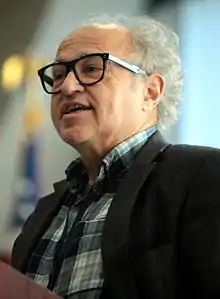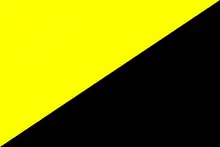David D. Friedman
David Director Friedman (born February 12, 1945) is an American economist, physicist, legal scholar, and anarcho-capitalist theorist. He is known for his textbook writings on microeconomics and the libertarian theory of anarcho-capitalism, which is the subject of his most popular book, The Machinery of Freedom.[2] Besides The Machinery of Freedom, he has authored several other books and articles, including Price Theory: An Intermediate Text (1986), Law's Order: What Economics Has to Do with Law and Why It Matters (2000), Hidden Order: The Economics of Everyday Life (1996), and Future Imperfect (2008).[3]
David D. Friedman | |
|---|---|
 | |
| Born | David Director Friedman February 12, 1945 |
| Nationality | American |
| Spouse(s) | Elizabeth Cook |
| Institution | Santa Clara University |
| Field | Economics, law |
| School or tradition | Chicago school of economics[1] |
| Alma mater | Harvard University (BA) University of Chicago (PhD) |
| Influences | Ronald Coase, Friedrich Hayek, Robert A. Heinlein, Milton Friedman, Rose Friedman, Adam Smith, Richard Timberlake, Alfred Marshall |
| Contributions | The Machinery of Freedom |
| Information at IDEAS / RePEc | |
| Website | Official Website |
| Part of a series on |
| Libertarianism in the United States |
|---|
|
Life and work
David Friedman is the son of economists Rose and Milton Friedman. He graduated magna cum laude from Harvard University in 1965, with a bachelor's degree in chemistry and physics.[4] He later earned a master's (1967) and a Ph.D. (1971) in theoretical physics from the University of Chicago.[5] Despite his later career, he never took a class for credit in either economics or law.[6] He is currently a professor of law at Santa Clara University,[7] and a contributing editor for Liberty magazine. He is an atheist.[8] His son, Patri Friedman, has also written about libertarian theory and market anarchism, particularly seasteading.
The Machinery of Freedom
In his book The Machinery of Freedom (1973), Friedman sketched a form of anarcho-capitalism where all goods and services including law itself can be produced by the free market. Friedman advocates an incrementalist approach to achieve anarcho-capitalism by gradual privatization of areas that government is involved in, ultimately privatizing the law itself. In the book, he states his opposition to violent anarcho-capitalist revolution.[9]
He advocates a consequentialist version of anarcho-capitalism, arguing for it on a cost-benefit analysis of state versus no state.[10] It is contrasted with the natural-rights approach as propounded most notably by economist and libertarian theorist Murray Rothbard.
Non-academic interests
Friedman is a longtime member of the Society for Creative Anachronism, where he is known as Duke Cariadoc of the Bow. He is known throughout the worldwide society for his articles on the philosophy of recreationism and practical historical recreations, especially those relating to the medieval Middle East.[11] His work is compiled in the popular Cariadoc's Miscellany.[12] He is sometimes credited with founding the largest and longest-running SCA event, the Pennsic War; as king of the Middle Kingdom he challenged the East Kingdom, and later as king of the East accepted the challenge and lost (to himself).[13]
He was a teenage wargamer who taught his school friend, Jack Radey, founder of People's War Games, how to play such wargames as Tactics II.[14] Radey relates how Friedman and himself wrote to Charles S. Roberts claiming that they had found a first turn winning strategy for each of the two sides. Roberts replied that their interpretation of the rules was valid.[14]
He is a long-time science fiction fan, and has written two fantasy novels, Harald (Baen Books, 2006) and Salamander (2011).
He has spoken in favor of a non-interventionist foreign policy.[15]
Bibliography
Nonfiction
- 1988. Cariadoc's Miscellany.
- 1990 (1986). Price Theory: An Intermediate Text. Southwestern Publishing.
- 1996. Hidden Order: The Economics of Everyday Life. ISBN 0887308856.
- 2000. Law's Order: What Economics Has to Do with Law and Why It Matters. Princeton Univ. Press. ISBN 0691090092
- 2005. "The Case for Privacy" in Contemporary Debates in Applied Ethics. Wiley-Blackwell. ISBN 1405115483
- 2008. Future Imperfect: Technology and Freedom in an Uncertain World. ISBN 0521877326
- 2015 (1989) (1973). The Machinery of Freedom. ISBN 978-1507785607
- 2019. Legal Systems Very Different from Ours. ISBN 1793386722
Fiction
- Harald, 2006
- Salamander, 2011
References
- "The Machinery of Freedom" (PDF). p. 124. Archived (PDF) from the original on 17 December 2013. Retrieved 25 November 2012.
Much is made in libertarian circles of the division between 'Austrian' and 'Chicago' schools of economic theory, largely by people who understand neither. I am classified as 'Chicago'.
- Caplan, Bryan (2008). "Friedman, David (1945-)". In Hamowy, Ronald (ed.). Friedman, David (1945– ). The Encyclopedia of Libertarianism. Thousand Oaks, CA: SAGE; Cato Institute. pp. 194–95. doi:10.4135/9781412965811.n117. ISBN 978-1412965804. LCCN 2008009151. OCLC 750831024.
- Free Market Mojo. "An Interview with David D. Friedman" Archived 2010-11-22 at the Wayback Machine.
- Faculty Profile: David Friedman Archived 2014-07-22 at the Wayback Machine. Santa Clara Law School
- "My Academic Page". www.daviddfriedman.com.
- Athiparambath, Shanu (14 February 2016). "Economist David Friedman Says India Must Go Taller To Make Homes Affordable". Market Urbanism. Retrieved 4 October 2016.
- University, Santa Clara. "Santa Clara University". phonebook.scu.edu.
- Friedman, David D. "Atheism and Religion", Ideas.
- Friedman, David D (1995). "Revolution Is the Hell of It". The Machinery of Freedom. pp. 149–150. ISBN 0-8126-9069-9.
- Morris, Christopher. 1992. An Essay on the Modern State. Cambridge University Press. p. 62.
- "Friedman, David D. "On Restructuring the SCA"".
- "Cariadoc's Miscellany". www.pbm.com.
- F.L. Watkins (Fólki Þorgilsson). 2005. HERSTAĐR-SAGA: An Incomplete History of Pennsic Urbana, Illinois: Folump Enterprises
- Serval, Fred. "Jack Radey part 1 – The Origins of People's War Games". Homo Ludens. Fred Serval. Retrieved 11 May 2020.
- VoluntaryVirtues0com (22 September 2013). "Dr David Friedman on US Foreign Policy, Syria, Assad, Terrorism, WWII, Hitler, and much more..." – via YouTube.
External links
| Wikimedia Commons has media related to David D. Friedman. |
| Wikiquote has quotations related to: David Friedman |
- Official website
- Appearances on C-SPAN
- Profile on the website of Santa Clara University
- David D. Friedman at the Internet Speculative Fiction Database
- Booknotes interview with Friedman on Hidden Order: The Economics of Everyday Life, October 20, 1996.
- David D. Friedman publications indexed by Google Scholar
